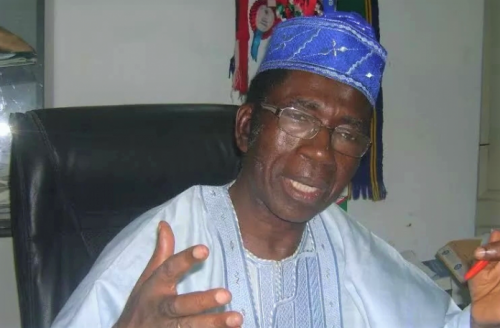
- Says strikes responsible for fallen standard, delivery of quality education
A former Minister of Education, Prof. Tunde Adeniran, has attributed the fallen standard and delivery of quality education in public tertiary institutions in Nigeria to the incessant strikes by lecturers,
While faulting the Academic Staff Union of Universities for frequently embarking on strike, he believed that ASUU had recently become more known for strike actions than for other critical functions that birthed its formation.
Adeniran, also a former Nigerian Ambassador to Germany, raised the controversies in chapter 3, page 52 of one of his books recently presented to the public titled, ‘Some Thoughts on Education in Nigeria.’
He said, “Strikes by Academic Staff Union of Universities have no doubt become one of the defining characteristics and features of Nigeria’s university system with serious impacts on the state of education in Nigeria
“One of the undeniable facts and reasons for the perceived fallen standard of education and the delivery of quality education is the epileptic nature of the school calendar as a result of too frequent strike actions in the system.
“When students spend a great deal of designated term/study time at home as a result of teachers’ strike, the eventual time spent on academic work is often insufficient to meet the expected exposure and concentration requirements for quality academic work.
“Academic activities are rushed to cover lost grounds and, in many cases, left uncovered. This adversely affects the quality of products and their ability to deliver on their areas of presumed and assumed competence in the open market and on the job.”
He suggested that to solve the problems and challenges in education, ASUU must address the issue of industrial action or strike.
The former minister also traced the birth of ASUU in 1978 following the proscription of the Nigerian Association of University Teachers in 1976.
Adeniran said, “The Academic Staff Union of Universities came into being when the erstwhile Nigerian Association of University Teachers, formed in 1965, was re-christened in 1978 with the promulgation of Decree 19 of 1976.
“The main purpose of ASUU, as a trade union and a pressure group, is to serve as an organisation of academic staff in universities; regulate relations between academic staff and their employers and among members; establish and maintain a high standard of academic performance and professional practice; establish just and proper conditions of service for its members; and protect and advance the socio-economic and cultural interests of the nation.
“From the above, it is evident that the union is required to serve as a formidable front for canvassing increased protection and improvement of members’ welfare, and of advancing the collective interest of the system.
“However, it appears that ASUU has recently become more known for strike actions than for other critical functions that gave rise to its formation.”
According to him, an analysis of the desperate state of education in Nigeria “does not require at this stage, a rehash of the debates regarding the correctness, rightness and legitimacy or otherwise of these strikes.”
He said well-meaning Nigerians were concerned essentially with the implications of the strike actions on such critical areas as quality of education, human capital development and general perception of the education system.
“From whatever angle one considers these, a negative effect has largely attended the incessant strike actions by ASUU”, he stated.





